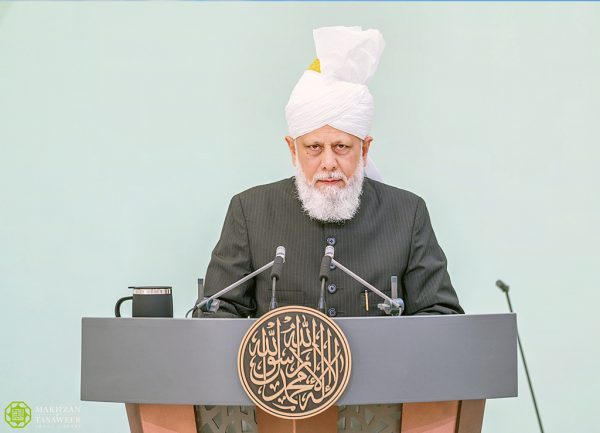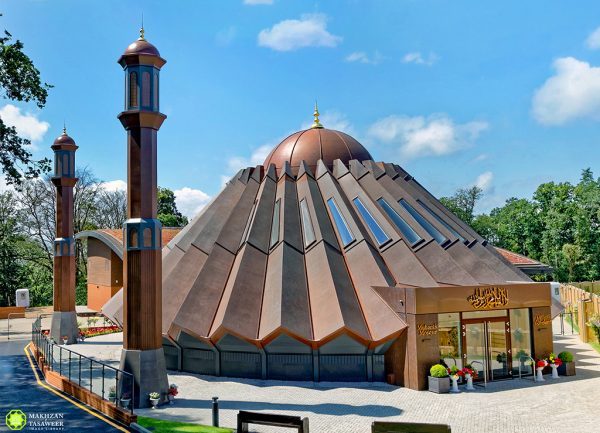After reciting Tashahhud, Ta`awwuz and Surah al-Fatihah, His Holiness, Hazrat Mirza Masroor Ahmad (aba) said that he had mentioned the background and reasons leading to the expedition of Hamra’ al-Asad in the previous sermon.

His Holiness (aba) that when the Holy Prophet (sa) learned of the Makkans’ plan to turn around and attack Madinah, the Holy Prophet (sa) summoned Hazrat Abu Bakr (ra) and Hazrat Umar (ra) to inform them of the intelligence he had received. They advised that the Muslims should go towards the enemy so that the children of Madinah were not put in danger. The Holy Prophet (sa) instructed Hazrat Bilal (ra) to make an announcement that they were heading out to confront the enemy and that only those who had taken part in the Battle of Uhud should set out for this battle.
His Holiness (aba) said that the Holy Prophet (sa) called for his flag to be brought which was still tied, and gave it to Hazrat Ali (ra), or according to other narrations he gave it to Hazrat Abu Bakr (ra). The Holy Prophet (sa) appointed Hazrat Ibn Umm Maktum (ra) as the leader of Madinah in his stead.
His Holiness (aba) said that the chief of the hypocrites Abdullah bin Ubayy bin Sulool approached the Holy Prophet (sa) to request permission to accompany the Muslim army. This was despite the fact that he had abandoned the Muslims at Uhud and took 300 others with him. He would certainly have been embarrassed about his act and perhaps wanted to try and make up for it. However, when he requested the Holy Prophet (sa), he was not granted permission.
Determination of the Companions Despite their Injuries
His Holiness (aba) said that many companions had sustained injuries during the Battle of Uhud. However, when the call was made for them to set out to confront the enemy once again, they did not hesitate or stop to continue tending to their wounds, rather they immediately hearkened to the call of the Holy Prophet (sa). God immortalised their actions in the following words of the Holy Qur’an:
‘As to those who answered the call of Allah and the Messenger after they had received an injury — such of them as do good and act righteously shall have a great reward.’ (The Holy Qur’an, 3:173)
His Holiness (aba) said that Hazrat Jabir (ra) had not participated in the Battle of Uhud, despite wanting to, on the request of his father who asked him to remain behind to look after his seven sisters, or according to some narrations his nine sisters. Hazrat Jabir (ra) accepted his father’s request and did not participate. Citing this reason, Hazrat Jabir (ra) requested to participate in the current expedition which he was setting out for. Hearing this loving request of Hazrat Jabir (ra) and granted him permission to accompany him.
His Holiness (aba) said that the Holy Prophet (sa) himself set out despite still nursing various injuries to his blessed face, shoulder and knees. The Holy Prophet (sa) offered two units of voluntary prayer in the mosque before departing. He then mounted his horse while clad in armour, such that only his eyes were visible. When the Holy Prophet (sa) saw Hazrat Talhah (ra), he asked where his armour was; despite nursing up to 70 injuries, Hazrat Talhah (ra) went to get his armour and accompany the armour. Hazrat Talhah (ra) said that in comparison to his own injuries, he was more concerned about the injuries which the Holy Prophet (sa) had endured.
His Holiness (aba) said that the Holy Prophet (sa) sent two companions ahead to gather information. When they reached Hamra’ al-Asad, the Quraish found and killed them. Later when the Muslims reached Hamra’ al-Asad, they found their bodies and they were then buried in the same grave.
His Holiness (aba) said that the main provisions which the Muslims had during the Expedition of Hamra’ al-Asad were dates. Hazrat Sa’d bin Ubadah (ra) brought 30 camels and dates which were enough to sustain the Muslims until reaching Hamra’ al-Asad, and so every day two to three camels would be slaughtered and eaten.
Military Strategy Deployed During the Expedition
His Holiness (aba) said that as a military strategy, whenever the Muslims set up camp somewhere, the Holy Prophet (sa) would instruct the companions to spread out and that each companion should light a fire. The companions would do this and these fires could be seen from far away. News of these fires spread and the general impression was given that the Muslims had brought a very large army.
His Holiness (aba) said that a man named Ma’bad Khuza’i met the Holy Prophet (sa) and expressed that the difficulties faced by him and the Muslims were difficult for him and his people to bear and expressed his desire for the Holy Prophet’s (sa) success. The Holy Prophet (sa) advised Ma’bad Khuza’i that since he was going towards the Makkan army, he should strike some fear into Abu Sufyan at his own discretion. Hence, upon meeting Abu Sufyan, Ma’bad Khuza’i said such things and recited such poetry that greatly embellished the strength and might of the Muslim army.
His Holiness (aba) said that by the time the Muslims reached Hamra’ al-Asad, the army of disbelievers had already fled having heard news about the Muslim army from Ma’bad Khuza’i, and so the Muslims only remained there for a short while before also departing back to Madinah. The Holy Prophet (sa) remained in Hamra’ al-Asad from Monday to Wednesday while other narrations say he remained there until the Friday before setting out to return to Madinah.
His Holiness (aba) said that he would mention further details in the future.

Appeal for Prayers
His Holiness (aba) urged continued prayers for the conditions of the world. May Allah keep every Ahmadi safe from every form of evil.
Funeral Prayer
His Holiness (aba) said that he would offer the funeral prayer of respected Faraz Ahmad Tahir who was recently martyred in Australia. He was at a shopping centre in Sydney where he worked as a security guard. He was attacked and stabbed. He was 30 years old. 12 others were injured in the attack while six others were killed, five of whom were women. He migrated to Australia from Rabwah, Pakistan in 2018. Upon seeing people running in a frenzy, he stepped forward to stop the assailant however this resulted in his demise. He is survived by three brothers, two sisters and his grandfather. The Australian Prime Minister and other high ranking officials have commended the bravery of Faraz Ahmad Tahir while expressing their condolences. The Prime Minister, Premier and others also attended his funeral. He is being regarded as a “national hero.”
His Holiness (aba) said that clearly shows he did not leave Pakistan for fear of death, rather he left due to growing weary of the religious restrictions that are placed upon Ahmadis. Faraz Ahmad Tahir was a joyous personality from his childhood. He was very hardworking and loved his siblings a great deal. He would always serve the Community, whether in Pakistan, Sri Lanka, or Australia. He would recite the Holy Qur’an in a melodious voice and was regular in offering his daily prayers. He had a great deal of respect for his elders of the Community and missionaries. He would be very obedient and fulfil whatever was instructed. He loved his faith and the Ahmadiyya Caliphate a great deal. 120 news stories and counting have been published about the incident while many are also sending messages of support and commending the heroism of Faraz Ahmad Tahir. The morning of his martyrdom, he had offered the pre-dawn voluntary prayer and said that he had prayed for his family. His Holiness (aba) prayed that may Allah elevate his station and grant patience to his family.
Summary prepared by The Review of Religions




Add Comment